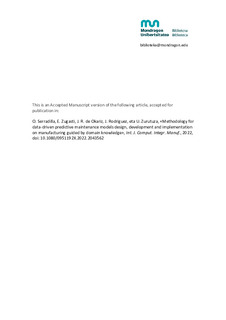Title
Methodology for data-driven predictive maintenance models design, development and implementation on manufacturing guided by domain knowledgeAuthor (from another institution)
Publication Date
2022Other institutions
Koniker, S. Coop.Version
PostprintDocument type
Journal ArticleJournal ArticleLanguage
EnglishRights
© 2022 Taylor and FrancisAccess
Embargoed accessEmbargo end date
2023-03-31Publisher’s version
https://doi.org/10.1080/0951192X.2022.2043562Published at
International Journal of Computer Integrated Manufacturing Published online: 02 Mar 2022Publisher
Taylor and FrancisKeywords
predictive maintenance
methodology
data-driven
domain knowledge ... [+]
methodology
data-driven
domain knowledge ... [+]
predictive maintenance
methodology
data-driven
domain knowledge
manufacturing [-]
methodology
data-driven
domain knowledge
manufacturing [-]
Abstract
The 4th industrial revolution has connected machines and industrial plants, facilitating process monitoring and the implementation of predictive maintenance (PdM) systems that can save up to 60% of ma ... [+]
The 4th industrial revolution has connected machines and industrial plants, facilitating process monitoring and the implementation of predictive maintenance (PdM) systems that can save up to 60% of maintenance costs. Nowadays, most PdM research is carried out with expert systems and data-driven algorithms, but it is mainly focused on improving the results of reference simulation data sets. Hence, industrial requirements are not commonly addressed, and there is no guiding methodology for their implementation in real PdM use-cases. The objective of this work is to present a methodology for PdM application in industrial companies by combining data-driven techniques with domain knowledge. It defines sequentially ordered stages, steps and tasks to facilitate the design, development and implementation of PdM systems according to business and process characteristics. It also facilitates the collaboration among the required working profiles and defines deliverables. It is designed in a flexible and iterative way, combining standards, state-of-the-art methodologies and referent works of the field. Finally, the proposed methodology is validated on two use-cases: a bushing testbed and a press machine of the production line. These use-cases aim to facilitate, guide and speed up the implementation of the methodology on other PdM use-cases. [-]
xmlui.dri2xhtml.METS-1.0.item-sponsorship
Comisión Europeaxmlui.dri2xhtml.METS-1.0.item-projectID
info:eu-repo/grantAgreement/EC/H2020/825030/EU/Digital Reality in Zero Defect Manufacturing/QU4LITYCollections
- Articles - Engineering [763]





















